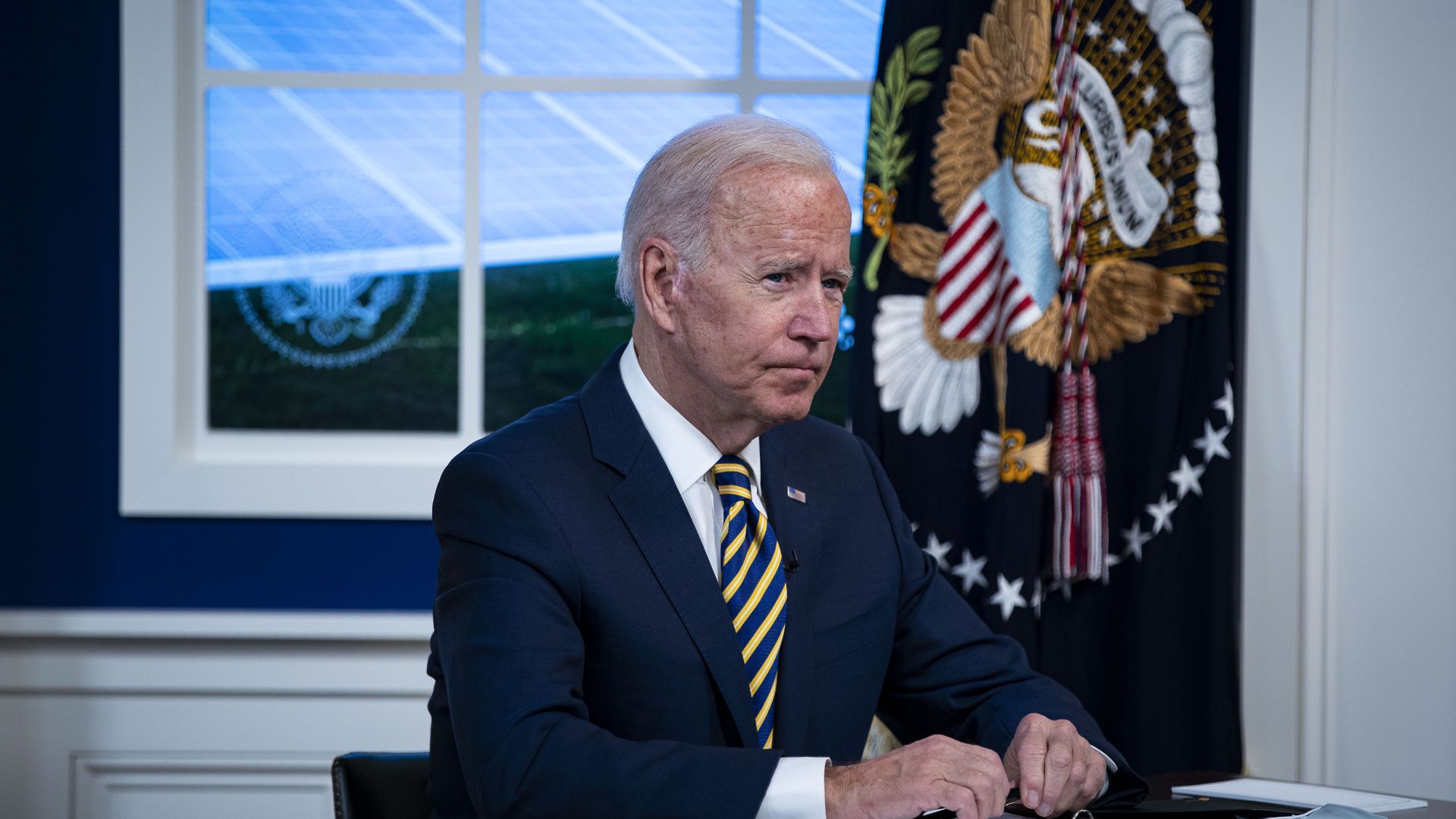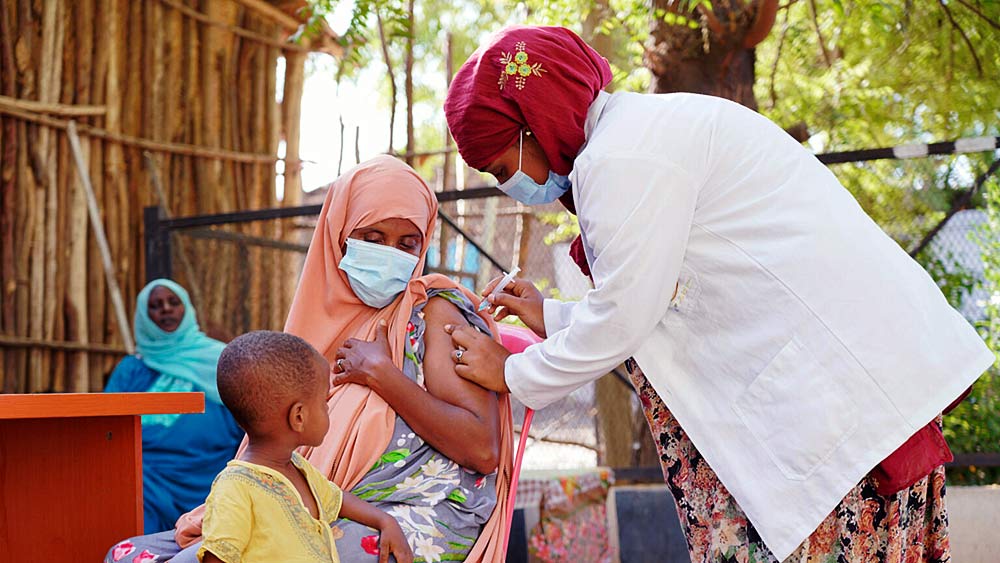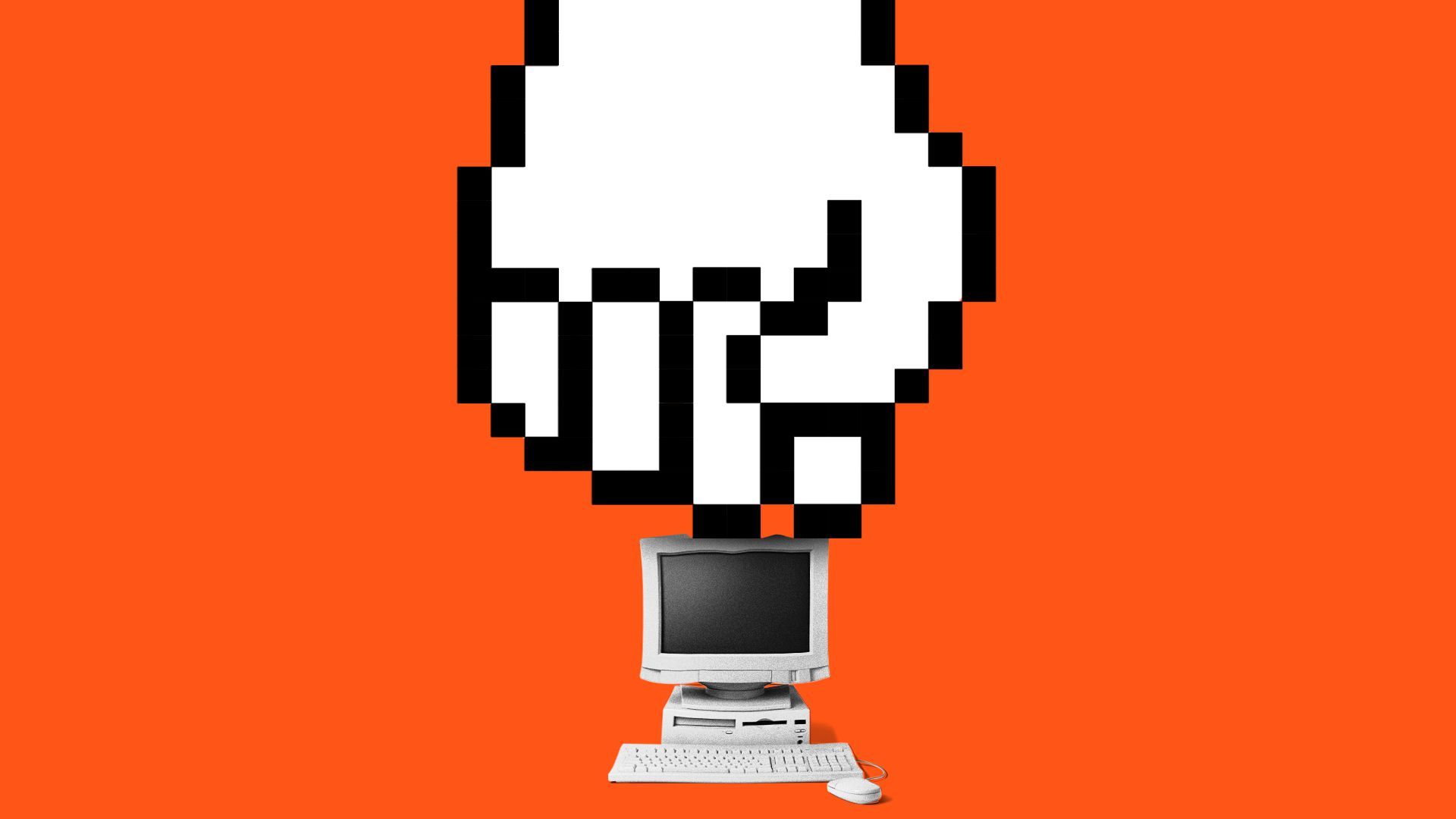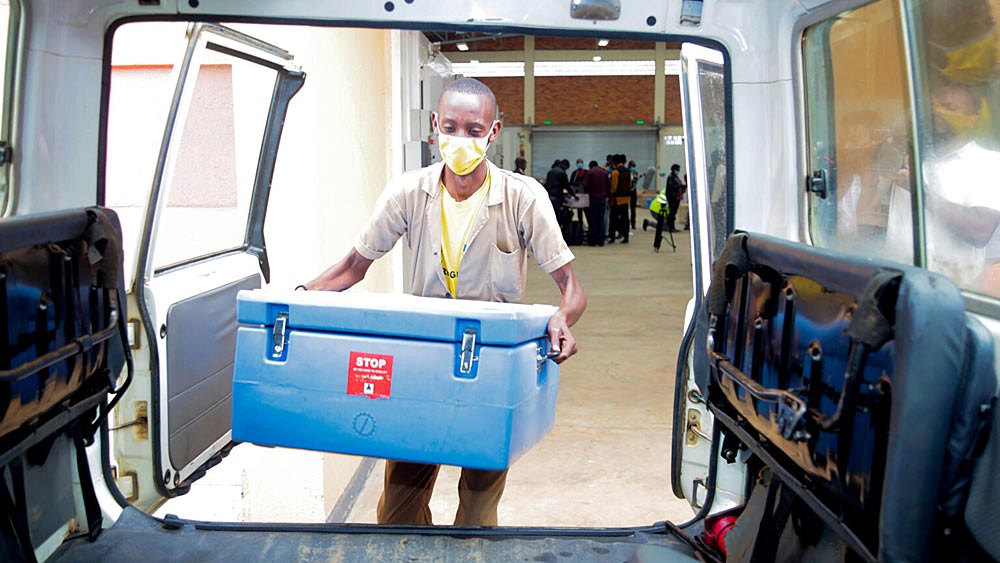| | | | | | | Presented By The U.S. Global Leadership Coalition | | | | Axios World | | By Dave Lawler ·Sep 20, 2021 | | Welcome back to Axios World. - Tonight (1,939 words, 7 minutes) we're seeking vaccine donations, planning a big speech, and popping some champagne.
Situational awareness: Canadians went to the polls today. You can follow the results here, and we'll catch you up on Thursday. | | | | | | 1 big thing: Biden's high-stakes COVID summit |  Data: Our World in Data; Chart: Kavya Beheraj/Axios President Biden will convene world leaders on Wednesday on the sidelines of the UN General Assembly to push them to do more to end the pandemic. Why it matters: There is still no functional plan in place to vaccinate the world, and past summits of this sort have flopped. The White House hopes that this virtual gathering will produce ambitious promises, accountability measures to track progress, and ultimately help achieve a 70% global vaccination rate this time next year. - The U.S. is reportedly seeking to buy another 500 million Pfizer doses for donation ahead of the summit, which would bring the total doses pledged by the U.S. to over 1 billion.
Invitations to the summit included requests that countries make specific pledges of their own. - India was a particular focus. As Axios reported, the Biden administration quietly pressured India to restart vaccine exports in part by promising a high-profile role for Prime Minister Narendra Modi at the summit.
- The backstory: India was set to be a primary vaccine supplier for lower-income countries before suspending most vaccine exports in March during a second wave at home.
- India's health minister announced today that exports would resume next month.
State of play: The 140 million doses the U.S. has donated to date are a drop in the global bucket, but still more than other rich countries have managed. - The EU promised another 200 million doses last week, to bring the total to 450 million, but it's distributed just 18 million so far.
- G7 countries have together donated just one-eighth of the doses they promised at a summit in June and are set to waste a combined 100 million doses this year, according to Max Hadler of Physicians for Human Rights (PHR).
The timing is also a bit awkward. Biden is about to launch a campaign to provide a third dose to millions of Americans, over the objections of the World Health Organization, at a time when just 6% of people in Africa have had a single shot. - "When people say we can do both, unfortunately, that's not true because at the moment we are in a zero-sum game. Vaccines used in one place will have to be necessarily taken away from some other place," Soumya Swaminathan, the WHO's chief scientist, said on a conference call today organized by PHR.
- Swaminathan noted that in most cases, boosters aren't necessary to prevent serious disease. "This is actually the time to prevent deaths," she said.
- "There's a myth that there's a glut of vaccines coming in 2022," added former CDC director Tom Frieden. At the current pace, he argues, some countries won't have enough doses until 2023 or beyond.
Experts on the call contended that while pledges to donate doses and supplies are helpful, more drastic action is needed to vaccinate the world, particularly if rich countries continue to prioritize boosters. - "Fundamentally, we're allowing two companies [Pfizer and Moderna] to hold the world hostage as they prioritize selling high-cost vaccines to rich countries and do little or nothing to scale up to close the global gap," Frieden said, making the case for temporarily waiving intellectual property rights to open up additional manufacturing.
|     | | | | | | 2. What you'll hear at the UN on Tuesday |  | | | Photo: Al Drago/Getty Images | | | | President Biden will use his first address to the UN General Assembly to lay out his vision for an era of "intensive diplomacy" with allies and "vigorous competition" with great powers — without a Cold War with China, Axios' Zach Basu writes. Driving the news: Biden is meeting this evening with UN Secretary-General António Guterres, who made headlines this morning when he urged the U.S. and China to repair their "completely dysfunctional" relationship for the sake of solving global challenges. - The tensions with China are contributing to a sense that a new international climate agreement — a primary focus this week at the UN — is unlikely this year.
Biden will stress in his remarks on Tuesday that he "does not believe in the notion of a new Cold War, with the world divided into blocs," according to a senior administration official who previewed the remarks on Monday. - "He believes in vigorous, intensive, principled competition that does not tip over into conflict."
Between the lines: Biden last week formed a new bloc with the U.K. and Australia focused intently on China, but in the process infuriated another close ally, France, which lost a major submarine contract. - The White House today confirmed that Biden is seeking to schedule a phone call with French President Emmanuel Macron this week to deal with the fallout.
What to watch on Tuesday: - President Jair Bolsonaro of Brazil will lead off the speeches in open defiance of the General Assembly's COVID policies (unvaccinated participants were asked to stay away).
- President Ebrahim Raisi of Iran will give his first major speech to an international audience.
- President Xi Jinping of China will offer pre-recorded remarks.
|     | | | | | | 3. Global news roundup |  | | | Paul Rusesabagina. Photo: Nicolas Maeterlinck/AFP via Getty Images | | | | 1. The real-life hero of the film "Hotel Rwanda," who later became a leading critic-in-exile of Rwandan President Paul Kagame, was found guilty today of forming a terrorist group. Flashback: Paul Rusesabagina was the manager of a luxury hotel in Kigali, which he turned into a safe haven for 1,268 people, mostly from the Tutsi minority, during the 1994 genocide that killed as many as 1 million people. - Kagame, who took power after the genocide and rules with an iron fist, claims Rusesabagina was plotting to overthrow the government.
- Rusesabagina, for his part, says he was kidnapped from Dubai and subjected to a sham trial.
2. Cuba this week became the first country in the world to begin the mass vaccination of children against the coronavirus, using a homegrown vaccine. 3. Mali's ruling junta is reportedly close to hiring 1,000 mercenaries from Russia's Wagner group and says it will ignore Western (mainly French) pressure on the matter. 4. Philippine boxer and Sen. Manny Pacquiao announced on Sunday he will run for president next year. 5. The U.S. has begun the process of deporting thousands of Haitians who had gathered at a border checkpoint in Texas. |     | | | | | | A message from The U.S. Global Leadership Coalition | | What's it worth to vaccinate 70% of the world against COVID-19? | | |  | | | | What's it worth? This week, world leaders will ask this very question at a global health summit hosted by the U.S. The answer: protecting the health of Americans and saving lives because as long as the virus is anywhere, no one is safe. Learn more: What's it worth to end the pandemic? Everything. | | | | | | Bonus: Where in the world | | Screengrab via Apple Maps We're taking a tour around the Baltic Sea, starting in a major former imperial capital (purple pin), visiting five capital cities on the coast (1–5) and ending in another city (red pin) that, while not on the sea, is the capital of a Baltic country. This one is pretty tough! Scroll to the bottom for the answer. |     | | | | | | 4. Tech giants bow to Putin pressure |  | | | Illustration: Aïda Amer/Axios | | | | Governments around the world are finding it easier than ever to make the internet, and the companies that run it, knuckle under, Axios' Scott Rosenberg writes. Why it matters: From the Arab Spring to the Black Lives Matter protests, the internet has helped organizers build popular movements and even, on occasion, overthrow governments. - But for now, at least, the tables have turned. Governments are limiting or banning applications, content and connectivity itself — and Big Tech companies, rich and powerful as they are, can't or won't fight back.
Zoom in: Russia Friday forced Apple and Google to remove an app that supporters of dissident leader Alexei Navalny had created to coordinate opposition votes in Russian elections. - The government had threatened specific Apple and Google employees with prosecution if the companies did not act to remove the "illegal" app.
- Once the app, which distributed information to opposition voters on how best to deploy their ballots, got blocked, Navalny organizers started using Telegram to spread the word, but by the end of the day, that service had taken down their account, too.
Between the lines: Companies aren't sovereign, so when governments take legal action against them, whatever the motivation, they have little choice but to buckle under or stop operating in a particular nation. - That last option is largely out in China, where most of the U.S.-based internet giants have either been sidelined or chosen to exit, and most online services are provided by domestic firms that can't pick up stakes and leave.
- China's model may well become more common as governments seek control — and as the technology powering internet services becomes easier to copy.
Go deeper: U.S. condemns Russia's election crackdown as Putin's party wins big majority |     | | | | | | 5. What I'm reading: How Taliban fighters are feeling |  | | | Taliban fighters perform evening prayers. Photo: Bulent Kilic/AFP via Getty | | | | A month after a total victory that was 20 years in the making, Taliban fighters in Kabul are adjusting to life not as warriors, but as traffic cops and security guards. WaPo's Susannah George spoke to around 25 of them to see what they made of it all. -
"All of my men, they love jihad and fighting," said one commander. "So when they came to Kabul they didn't feel comfortable. There isn't any fighting here anymore."
One man George spoke to had returned home from Dubai, where he was working as a ride-share driver, in order to become a suicide bomber. - "I didn't think that one day I would be a soldier with the important job of securing an airport," he said. He was initially disappointed but said martyrdom was "still possible in this role because this is still jihad."
Some fighters said they were homesick for their villages and missed interacting with the people, rather than operating from inside a compound. - One hoped that, with the war over, he'd be able to study for an economics degree.
- Others wondered why so many Afghans had fled when they were promised amnesty, or whether foreign diplomats (and foreign cash) would return.
The group's actions have often not matched their public rhetoric, but the fighters said their unit was under orders to maintain order and minimize the use of force. - "Our leaders will decide what will happen to the artifacts here," said a man guarding the national museum. "We don't have the authorization to destroy them yet."
Go deeper: Taliban replaces women's ministry with ministry of virtue and vice. |     | | | | | | 6. 1 bubbly thing: Champagne diplomacy |  | | | Photo: Bertrand Guay/AFP via Getty Images | | | | Organizers of La Fête du Champagne 2021 are popping corks tonight, after the Biden administration's decision to let fully vaccinated travelers from around the world back into the U.S. starting in November, Axios' Margaret Talev writes. Driving the news: Hundreds of top U.S. enthusiasts and collectors were set to attend the Oct. 9–16 festival in New York. But because of the travel ban, the guests of honor — more than 30 of the best small and large producers — seemed destined to be stuck across the Atlantic. - Now, event co-founder Daniel Johnnes told Margaret and me they're scrambling to rebook for November so everyone can come.
- "I've heard from a number of French who are celebrating in their wineries that they're finally going to get to come," said Johnnes, who's also the wine director for chef Daniel Boulud.
Why it matters: Bien sur, the festival's concerns fall into the category of first-world problems, and today's tensions between the U.S. and France extend beyond travel to nuclear technology. - But Johnnes makes the case for "champagne diplomacy," rather than the animosity and boycotts the existed between the allies at the start of the Iraq War.
- "People have grown up and said, 'Let the politicians do their thing, we love French wine ... we have to move on."
The bottom line: "I'm going to drink a bottle of champagne tonight," Johnnes said. |     | | | | | | 7. Stories we're watching |  | | | Checking temperatures at a school in Peshawar, Pakistan. Photo: Abdul Majeed/AFP via Getty | | | - Biden threatens Ethiopia with sanctions over Tigray
- Shooting at Russian university
- "Quad" countries to discuss microchip supply chains
- Tribal lands dispute in Brazil
- Israeli forces capture last 2 escaped Palestinian prisoners
- UN Security Council extends Afghan mission by six months
- Hong Kong holds first "patriots only" elections
Quoted: "Men are also represented." — One Twitter reaction to Albania's new government, in which 12 of 17 ministers are women. |     | | | | | | A message from The U.S. Global Leadership Coalition | | What's it worth to strengthen global health systems? | | |  | | | | World leaders will meet at this week's global summit to ensure delivery of vaccine shots in arms in the world's hardest to reach places. Strengthening health systems will not only end this pandemic but stop the next one. What's it worth? Keeping our kids in school and protecting America's recovery. | | | | Answers: St. Petersburg (purple pin), Stockholm, Copenhagen, Helsinki, Tallinn, Riga (1–5) and Vilnius (red pin). |  | | It'll help you deliver employee communications more effectively. | | | | | | Axios thanks our partners for supporting our newsletters. If you're interested in advertising, learn more here.
Sponsorship has no influence on editorial content. Axios, 3100 Clarendon Blvd, Suite 1300, Arlington VA 22201 | | | You received this email because you signed up for newsletters from Axios.
Change your preferences or unsubscribe here. | | | Was this email forwarded to you?
Sign up now to get Axios in your inbox. | | | | Follow Axios on social media:    | | | | | |
Post a Comment
0Comments